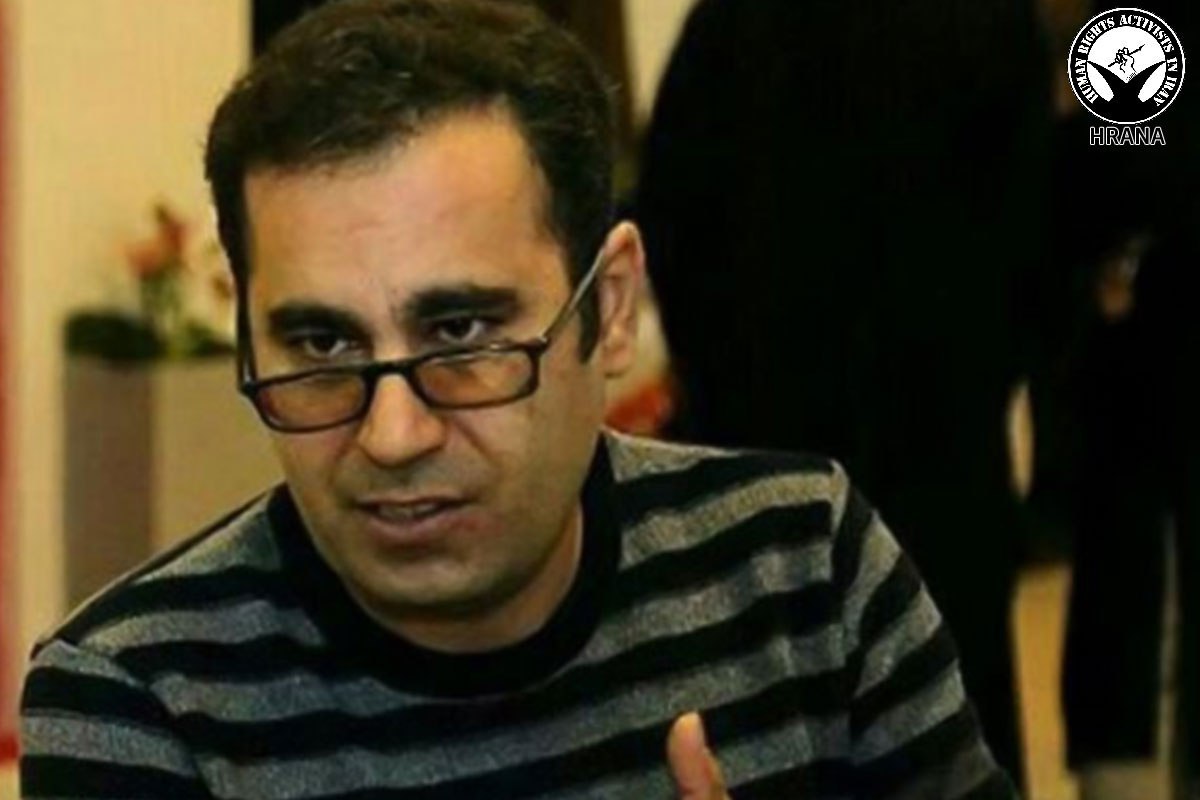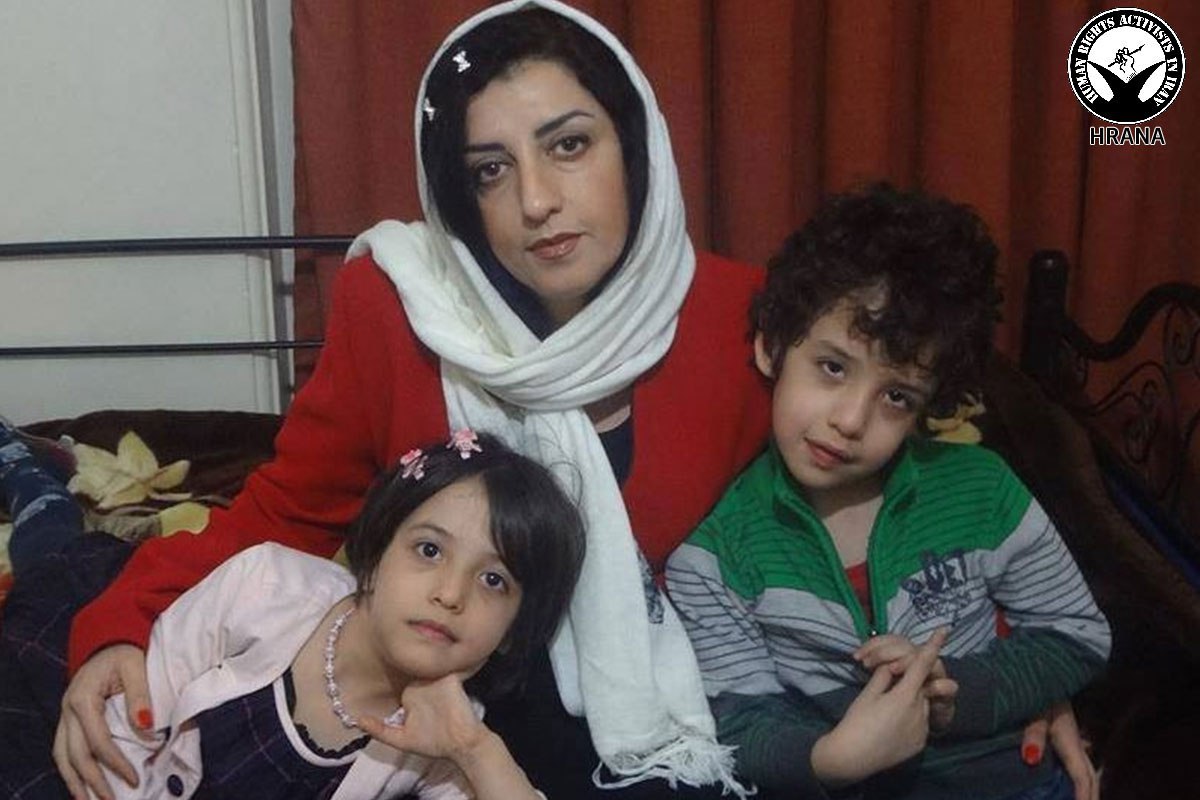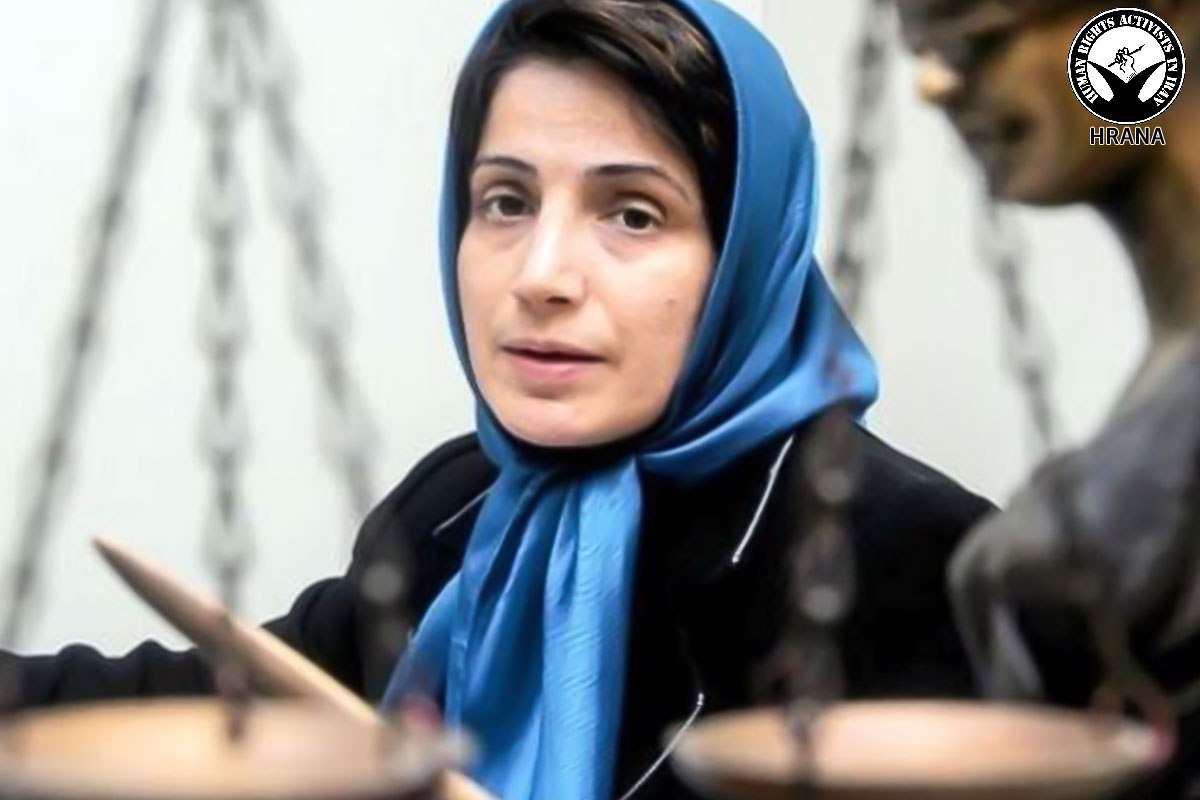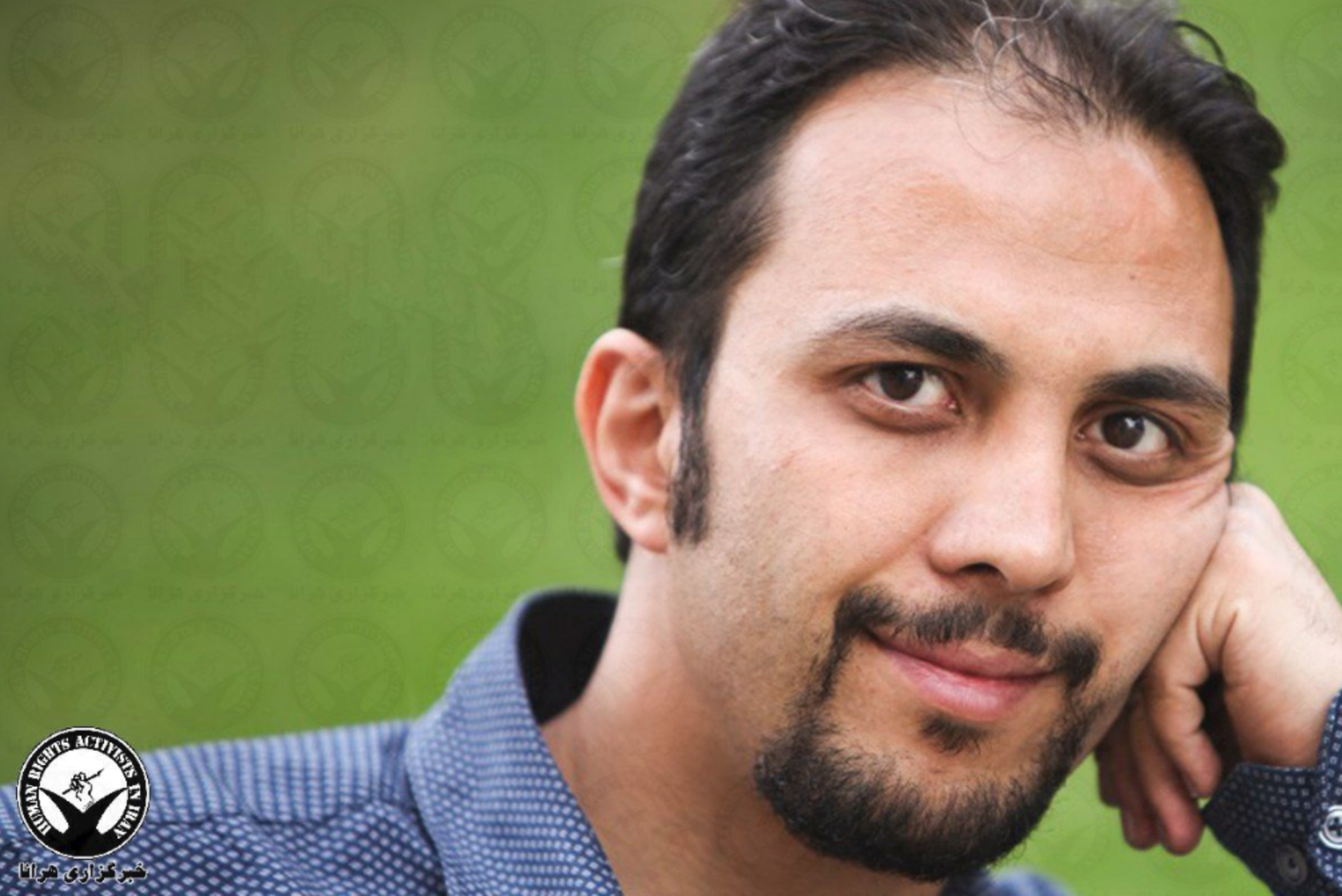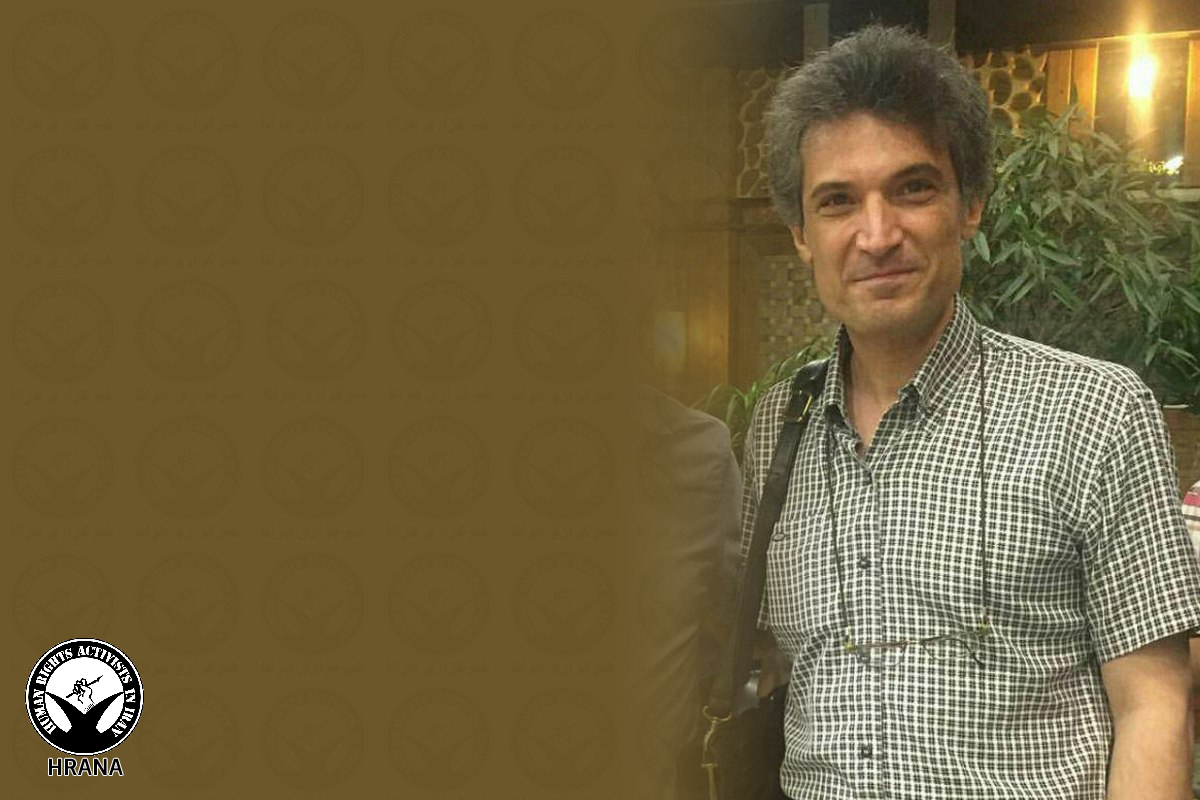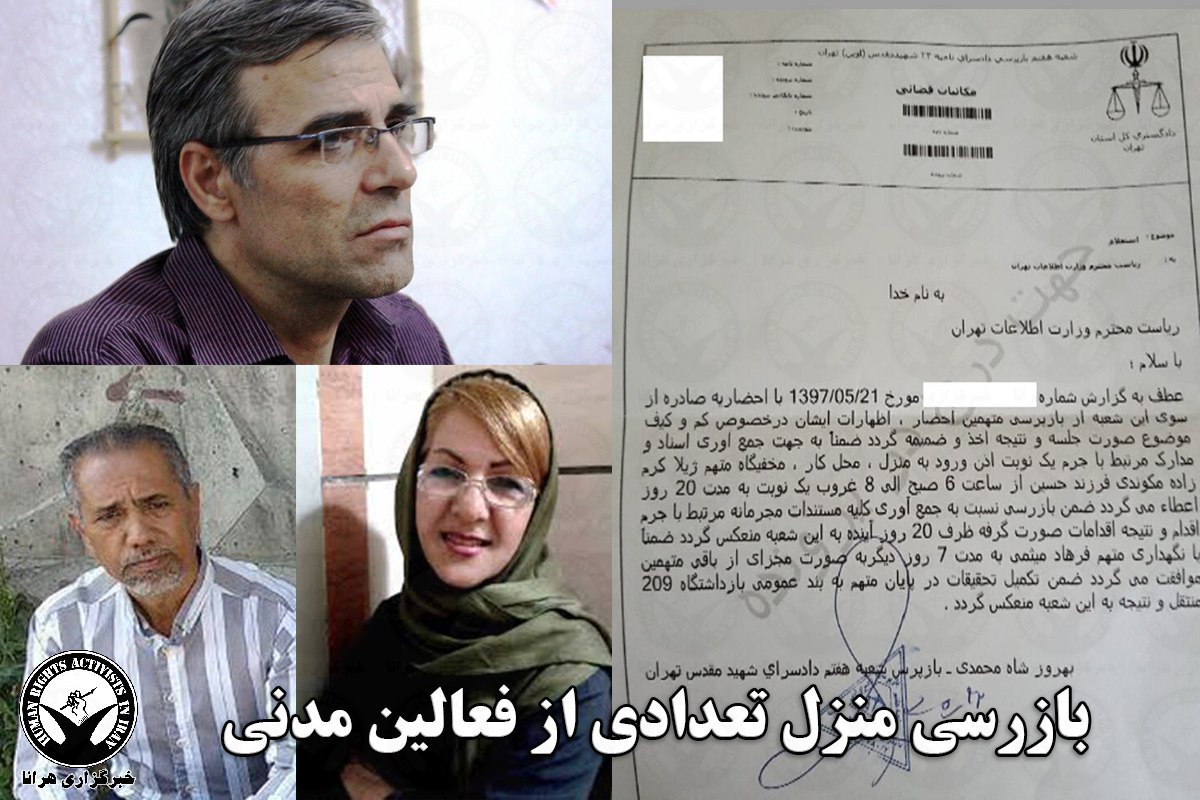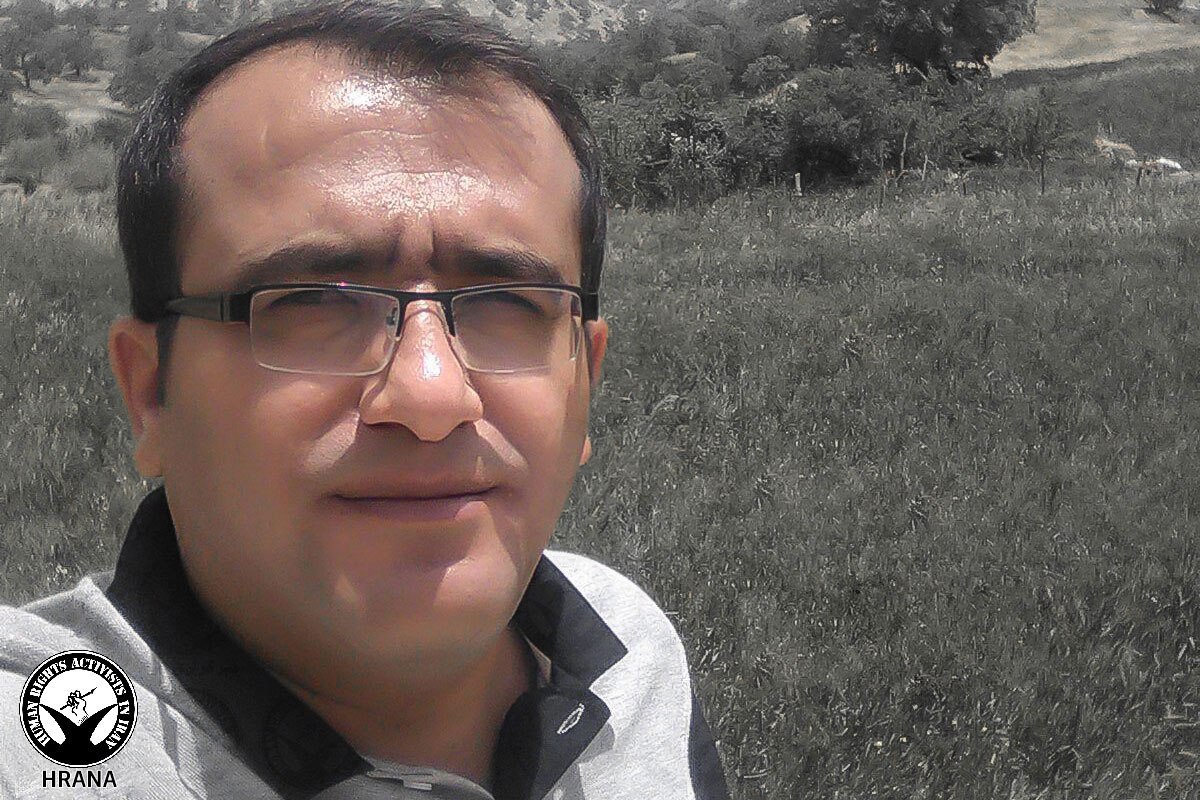Human Rights Activists News Agency (HRANA) – Ebrahim Nouri, an Azerbaijani civil rights activist from Ahar, has entered the first days of a six-month prison sentence for a case opened against him in 2016.
After being arrested during a gathering at Babak Fort, he was denied the right to post bail and imprisoned in Ward 209 of Evin Prison on July 2, 2018. An informed source told HRANA that Nouri contacted his family from Ward 209 at that time, informing them of the $29,000 USD bail set for him.
In July, HRANA reported on Ebrahim Nouri’s arrest by security forces at the Babak Fort gathering.
In a press release on August 11, 2018, Amnesty International called the recent arrests of Azeri people “arbitrary” and unlawful, and demanded the immediate release of Ebrahim Nouri and all other individuals detained for their participation in an Azerbaijani Turkic cultural gathering.
Stemming from a 2016 arrest, Nouri was sentenced by Branch 1 of the Criminal Court of Ahar to his current sentence of 6 months’ imprisonment, on a charge of “Propaganda against the regime”. In February 2018, this sentence was confirmed by Branch 26 of the Appeals Court of East Azerbaijan Province, under the supervision of Mikaeil Khoubiarpour.
Nouri, a law student, has a record of being detained for civic activities, beginning in 2005 when he was arrested and interrogated by an IRGC Intelligence unit. In 2009 he was sentenced to ten months’ imprisonment, suspended over five years, on a charge of propaganda against the regime. He was arrested again by security forces on January 17, 2013, and released on a bail of approximately $24,000 USD five days later.
Tag: Evin Prison
Mohammad Habibi Returns to Prison from Hospital without Adequate Medical Care
Human Rights Activists News Agency (HRANA) – On Sunday, August 26, 2018, Mohammad Habibi’s medical leave from prison was cut short when he was returned to detention before receiving adequate care.
The union activist and member of the board of directors of the Teachers’ Union Association of the Province of Tehran was being treated at Imam Khomeini Hospital. He was recently sentenced to a ten-year prison term and 74 lashings.
Sedigheh Pakzamir, a close associate of Habibi, stated in an online post that it took 45 days for prison authorities to act on the order for Habibi to be transferred to an outside medical clinic. When they finally carried out the order — which stipulates that Habibi receive medical attention — he was returned to the prison without receiving any.
Pakzamir added that Habibi is symptomatic for lung and urinary tract infections. As such, the doctor recommended he undergo a battery of specialized medical tests, including a sonography, on Monday.
Fatemeh Saeidi, Member of Iran’s Parliament (representing Tehran) and of the Parliament’s Education and Research Commission, previously stated that Habibi was being held in a ward housing violent criminals, and that a letter outlining his predicament containing a request for his sentence to be reduced was signed by a number of Parliament representatives and addressed to the head of the Judiciary.
On August 4, 2018, Habibi’s attorney Amir Raeisiyan reported that his client was sentenced to ten and a half years’ imprisonment. Given that the maximum cumulative prison sentence for all of Habibi’s charges would be seven and a half years, he cannot be required to serve longer. Habibi was subjected to the additional penalties of 74 lashings, a two-year ban on civic activities, and a two-year travel ban.
Prior to this, the International Trade Union Confederation issued a letter to the Islamic Republic in objection to Habibi’s heavy sentence, demanding his immediate and unconditional release. Education International, a teachers’ union federation, has also protested the verdict and demanded Habibi’s release.
In a statement, the Council for Coordination of Teaching Syndicates protested Habibi’s sentence, calling it a litmus test for the justice meted by the Iranian Judiciary. This council demanded the immediate and unconditional release of Habibi, stating, “It is as if the judge intended with his verdict to put society on guard, sending the message that if you pursue justice, you will face prison and lashings.”
On July 16, 2018, over 100 teachers, all alumni of Shahid Rajai University, met with a Mr. Abdi, the Minister of Education’s advisor in Union Affairs, and delivered him a letter in defense of Mohammad Habibi. In the letter, the signatories expressed “great concerns regarding Mr. Habibi’s health”, and requested he be transferred to Evin Prison in accordance with his charges. It also implored the Ministry of Education to pursue the demands of the letter to the furthest degree possible, and to keep the signatories and Habibi’s family abreast of their findings.
A letter signed by 6,500 teachers and civil society activists demanding the release of Mohammad Habibi was delivered to Iranian Parliament on July 25, 2018.
On May 10, 2018, the Council for Coordination of Teaching Syndicates urged teachers, be they retired or employed, to assemble in protest across the country. In Tehran, several of those who responded to the call were arrested and transferred to Evin Prison; all but Mr. Habibi were released on bail three days later.
Mohammad Habibi was previously arrested at his place of employment on March 3, 2018 and jailed for 44 days. On April 15, 2018, he was released on a bail of approximately $50,000 USD.
Mohammad Habibi is currently imprisoned in Tehran’s Evin Prison, and according to a letter from his HR office, is no longer receiving his salary.
Narges Mohammadi Back in Evin Prison after Hospitalization
Human Rights Activists News Agency (HRANA) – Narges Mohammadi, imprisoned deputy head of Iran’s Center for Supporters of Human Rights who had been transferred to Imam Khomeini hospital on August 13th due to her grave health condition, has been sent back to Evin Prison.
Taqi Rahmani, Mohammadi’s husband, released a statement to announce his wife’s return to prison: “Narges needs sick leave to continue her treatment,” Rahmani wrote. “Yesterday, her children were waiting for their mother to call, and the call never came. She has the right to treatment.”
Mohammadi had previously been hospitalized on June 30th, and shortly after undergoing surgery was sent back to Evin on July 5th. On August 6th, prison authorities denied her transfer to see a neurological specialist outside the prison.
According to Mohammadi’s lawyer Mahmood Behzadirad, her requests for conditional medical release are consistently denied. Four years remain of the ten-year sentence she is currently serving.
Mohammadi was sentenced in Tehran’s Revolutionary Court in May 2016 to two concurrent imprisonments of ten and six years. Mohammadi reported that the trial judge displayed an openly hostile attitude toward her while endorsing the allegations of the Ministry of Intelligence. The ten-year sentence stemmed from a charge of “forming a society to disrupt national security,” for campaigning to end capital punishment in Iran. Her six-year sentence was for “organizing and colluding against national security” and “propaganda against the regime.”
Among the pieces of evidence used against her on the latter counts were her media interviews, participation in peaceful protests supporting prisoners on death row, her correspondence with fellow activists like Nobel Peace Laureate Shirin Ebadi, and her 2013 meeting with former European Union Foreign Policy Chief Catherine Ashton.
Branch 36 of Tehran’s Appeals Court confirmed Narges Mohammadi’s sentence in the Fall of 2016. In May 2017, Iran’s Supreme Court refused to appeal the decision.
Nasrin Sotoudeh Starts Hunger Strike in Evin Prison
Human Rights Activists News Agency (HRANA) – Nasrin Sotoudeh, prominent lawyer and human rights activist, who has been detained in Tehran’s Evin Prison since June 13th, started a hunger strike on Saturday, August 25th.
Sotoudeh has published an open letter to declare her hunger strike. The arrest and harassment of her family members and friends is the reason behind her protest, she says in the letter.
Sotoudeh’s husband, Reza Khandan, published a note to confirm his wife’s hunger strike.
The full text of Nasrin Sotoudeh’s letter, translated by HRANA:
My fellow Iranians,
After I was arrested two months ago, agents of the Ministry of Intelligence undertook the unlawful action of arresting the esteemed citizen, Dr Farhad Meysami. They searched his house and that of his relatives and friends to discover evidence of protest against mandatory veiling.
After they failed to find anything in the house of my husband’s sister, they confiscated a satellite device [instead].
Since none of my correspondences to the authorities has been so far responded to, I have no choice but to embark on a hunger strike to protest against the arrests and judicial pressures brought upon my family, relatives and friends.
In the hope that law and justice will one day prevail in our beloved country, Iran.
Nasrin Sotoudeh
August 2018
<b> —- </b>
Nasrin Sotoudeh had recently refused to appear in court, despite a summons order issued by the authorities. She wrote an open letter to explain why.
According to a report published by HRANA on August 18th, Reza Khandan’s house and the house of other relatives and friends of the family were raided by the authorities.
<b> *** </b>
<h3> UPDATE: </h3> Nasrin Sotoudeh ended her hunger strike on October 3, 2018, her lawyer Mohammad Moghimi told HRANA.
Journalist Hamed Ayinehvand Denied Bail, Moved from Solitary Confinement to General Ward
Human Rights Activists News Agency (HRANA) – Hamed Ayinehvand, a journalist and political activist who was arrested on June 27, 2018, by security forces belonging to the Intelligence unit of Tehran’s Islamic Revolutionary Guard Corps (IRGC), has been transferred from solitary confinement, where he spent 44 days after his arrest, to a general ward in Evin Prison.
The Prosecutor of Branch 7 of the Evin Prosecutor’s office has denied Ayinehvand bail, despite the completion of the investigations process and the judicial proceedings. The charge issued against him is “Propaganda against the regime through cyberspace activities”.
A source close to the case told HRANA: “Mr Ayinehvand’s family is worried about [his] mental condition which was described as inappropriate based on his family’s observation [of him] during their last prison visit.”
Hamed Ayinehvand is a political activist, journalist and PhD student of international relations at the Islamic Azad University’s science and research department. Furthermore, Ayinehvand was a *disqualified candidate in Iran’s most recent Parliamentary election.
*Iran’s Guardian Council is responsible for vetting the qualifications of parliamentary candidates and determines who is eligible to run for Parliament.
Imprisoned Civil Rights Activist Farhad Meysami on Hunger Strike
Human Rights Activist News Agency (HRANA)- Farhad Meysami, who was arrested and transferred to Ward 209 of Evin Prison on July 31, 2018, has been on hunger strike since August 1st. He faces charges of “Collusion and conspiracy to threaten national security”, “Disseminating propaganda against the regime,” and “Insulting the hijab, an essential sacrament of Islam” from Branch 7 of Evin Court.
Reza Khandan, husband of Nasrin Sotoudeh, the human rights lawyer who was previously imprisoned on similar charges, related Mr Mesyami’s case updates to HRANA.
“Farhad Meysami [declared his strike] when he contacted his mother, which was 20 days into his detention,” Mr Khandan said, explaining that news hadn’t spread earlier because Mr Meysami was being held in solitary confinement. In the same phone conversation, according to Mr Khandan, Mr Meysami said he was anticipating a transfer to the prison’s general ward in three days.
Reading from the interrogation sheet intended to elucidate his charges, Mr Meysami cited accusations of “provoking women to appear without hijab in the street”. Mr Khandan conjectures that Mr Meysami’s charges actually stem from his possession of pin-back buttons reading “I protest mandatory Hijab”.
“Farhad Meysami’s mother was extremely worried following the news of his hunger strike and intimated that she wanted to start a hunger strike as well,” Mr Khandan added. “But some friends and I dissuaded her, given her age and her need to take medications on a daily basis.”
Earlier, Arash Keikhosravi — who has been detained in the Great Tehran Penitentiary for the past four days — told HRANA that “on Sunday, August 12th, Mr Meysami’s mother and I went to Branch 7 of Evin court to follow up on his case and to see how he was doing. I planned to register as his lawyer, but the officials at the branch told me that section 48 of the Criminal Procedure Code bars me from doing so.”
Section 48 of the recently-amended Criminal Procedure Code states that those accused of national-security crimes must choose their lawyer from a list approved by the Iranian judiciary. Human Rights Organizations have argued that this new policy gives further license to infringe on the rights of defendants.
Mr Keikhosravi also said that “Mr Meysami’s mother went to see the case investigator after receiving a phone call in which she could hear the sounds of her son’s interrogation and torture.”
The investigator reportedly denied that the call had come from Evin authorities, promising her a phone call from her son to alleviate some of her worries and assure her of his wellbeing.
Security Forces Storm the Residences of Civil Activists
Human Rights Activists News Agency (HRANA) – This morning, Saturday, August 18, 2018, security forces of the Ministry of Intelligence stormed the private residences of Reza Khandan, Mr Khandan’s sister, Mohammadreza (Davoud) Farhadpour and Jila Makvandi. The security forces produced inspection orders issued by Branch 7 of Evin Court, searched the residences thoroughly and confiscated a number of items belonging to the aforementioned individuals.
Reza Khandan, the husband of Nasrin Sotoudeh, told HRANA, “This morning, Saturday, August 18, between 8 and 10 am, security forces of the Ministry of Intelligence entered our home and searched every inch of it. After that, they went to the home of Mr Mohammadreza (Davoud) Farhadpour and searched his home in its entirety as well. At the same time, in an unusual attempt, the security force went to my sister’s home and violently searched the entire place, going so far as individually inspecting every page of her child’s notebook. Two hours later, they arrived at our neighbor’s door and asked them a number of questions about us. It is likely that their invasion of my sister’s privacy is merely an attempt to further pressure my family; there simply is no other explanation for it. The security forces had in hand an order issued by the Branch 7 of Evin Court.”
Reza Khandan added, “The security forces were only looking for [pinback buttons] with [the words] ‘I oppose mandatory veiling’. They also took some of the letters that my wife, Nasrin Sotoudeh, had sent from prison.”
This morning, Jila Karamzadeh Makvandi reported of her home’s inspection in a post affixed with the inspection order. She wrote, “This morning at 10 am agents from the Ministry of Intelligence inspected our home using this order. The inspection was in regards to Dr Maysami’s books and the [lapel pins] with the engraving‘I oppose mandatory veiling.’”
Furthermore, in the order issued by Branch 7 of Evin Court and posted by Jila Karamzadeh Makvandi, in addition to the inspection of her residence, it is stated that Farhad Maysami is being held in solitary confinement.
Fifteen Days after Arrest, Farhad Meysami Still Held Incommunicado
Human Rights Activists News Agency (HRANA) – On August 12th, Farhad Meysami’s mother, along with lawyer Arash Keykhosravi, went to the Public Prosecutor’s Office of Evin Prison to inquire about his status and register Keykhosravi as Meysami’s attorney. Evin’s interrogation branch 7 denied the registration, referencing clause 48 of Iran’s Criminal Procedures Regulations.
HRANA reported on Meysami’s arrest by security forces in his home on the evening of July 31, 2018. He was transferred to Ward 209 of Evin Prison and has not been heard from since.
Keykhosravi confirmed that he was denied the right to represent Meysami on August 12th, adding that Meysami’s mother was frantically seeking answers after receiving a phone call in which sounds of her son’s torture, and supposed confession, could be heard. The interrogator at Branch 7 denied the call was made by prison authorities, and promised her a well-check phone call from her son.
Stating that there is no further information available about Meysami’s charges, Keykhosravi continued, “Many cases involving security charges have no security basis at all. When someone criticizes an issue or actively stands up against something, the government immediately treats it as a national-security case and deprives that person of their basic and fundamental rights. As it concerns Mr. Meysami, we suspect he was arrested for his criticism of the mandatory hijab, which affects neither domestic nor foreign security. Objections like these are the mere expression of differing ideas and perspectives. Elevating such cases into security accusations is a violation of people’s fundamental rights, including the right to choose a lawyer, which is revoked per clause 48 of the Criminal Procedures Regulations.”
According to clause 48 of the new Criminal Procedure, during the initial stages of investigation against those accused of political and national-security crimes, defendants must pick their attorney from a list of lawyers pre-approved by the judiciary. Citizens’ rights organizations claim that this law infringes on the rights of the accused.
Revolutionary Court Racks up Punishments on Journalist Seyed Tabib Taghizadeh
Human Rights Activists News Agency (HRANA) – Seyed Tabib Taghizadeh, journalist and editorial board member of the website Baztab-e-Emrooz, has received a phone call from branch 1 of Evin Prison’s Office of Enforcement summoning him to serve a prison sentence–but that’s not all.
While Taghizadeh had been living in the shadow of the two-year suspended imprisonment issued to him in April 2018 for “acting against national security through connections with antagonistic media,” his attorney Mahmoud Alizadeh Tabatabai told HRANA that new constraints have been tacked onto his client’s sentence, per a request from the bailiff of branch 23 of the Revolutionary Court in Tehran, presided by Judge Shahmirzadi.
“According to the [updated] verdict,” his attorney explained, “Mr. Taghizadeh […] will be banned from professional media activities for five years; he will also be prohibited for three years from traveling, political activity, membership in political parties, and cyber activities.” Per the terms of his amended sentence, Taghizadeh will also be mandated to present himself in Evin court once per year.
Taghizadeh was arrested for working to rehabilitate the Baztab-e-Emrooz website after it was filtered in his home during a February 8, 2016 raid by authorities. Upon his arrest, he was transferred to solitary confinement in ward 209 of Evin prison where he stayed for 36 days. After having a stroke in prison, he was released on bail.
A close source to Taghizadeh previously told HRANA that he proclaimed innocence, denying a relationship with the former editorial board of Baztab-e-Emrooz. However, the court cited instances of [filtered] web content that was later republished, such as news of an attack on Ayatollah Sanei’s office that had appeared in Farsi-language media outside of the country. Such instances were raised and accepted as sufficient evidence of Taghizadeh’s connection to “antagonistic” media.
Reporters Without Borders, a news agency specializing in the restrictions placed on reporters working across the world, identified Iran in its 2017 report as one of the world’s top 5 prison funnels for media activists. As imprisoned reporters are released after completing their sentences, more continue to find themselves on trial or behind bars for their work.
Political Activist Majid Azarpey Arrested, Begins Prison Sentence
Human Rights Activists News Agency (HRANA) – Majid Azarpey, a reformist political activist, was arrested on Wednesday, August 15, 2018, and transferred to the quarantine ward of Evin Prison.
Azarpey was sentenced in November 2015 to six and a half years in prison and fined approximately $300 USD (30,000,000 Rial) by branch 28 of the Tehran Revolutionary Court, presided by Judge Moghiseh. His sentence was reportedly upheld by branch 36 of the Tehran Appeals Court in November 2017.
When he was arrested on Wednesday, he was complying with a phone call he had received on Monday, summoning him to Evin court to pay the $300 fine.
Azarpey was previously arrested in June 2015 by Islamic Revolutionary Guard Corps (IRGC) Intelligence agents and released after eight months on approximately a $70,000 USD (7 billion Rial) bail on February 10, 2016.




